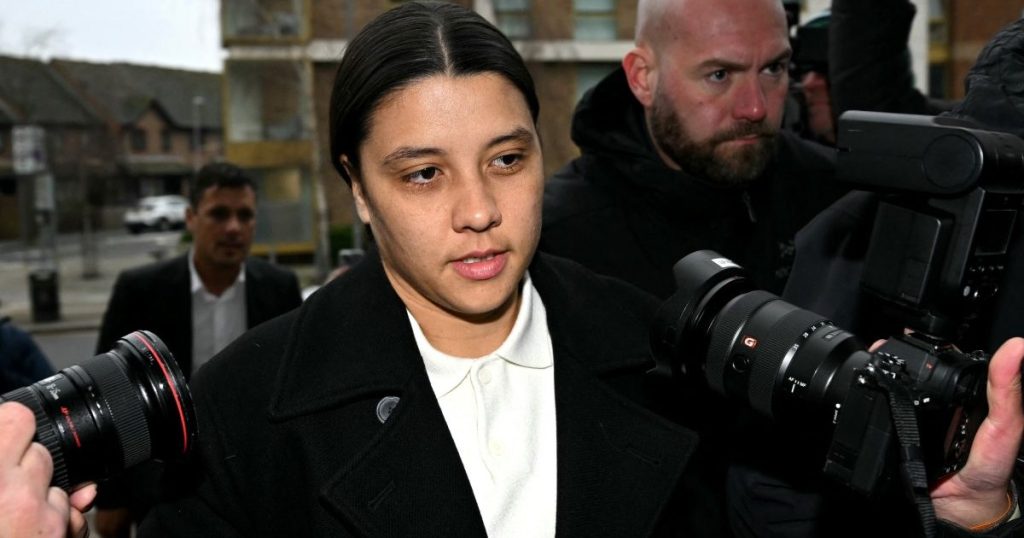The Australian soccer star, Sam Kerr, captain of her national team and striker for Chelsea in the Women’s Super League, found herself at the center of a racially charged legal battle following an incident at a London police station. Kerr, along with her partner, West Ham midfielder Kristie Mewis, had been involved in an altercation with a taxi driver in January 2023. The driver alleged that the pair had refused to pay for cleaning after one of them vomited in his vehicle and that one of them had broken a rear window. Subsequently, the driver took them to Twickenham Police Station. While there, Kerr engaged in a verbal exchange with police officer Stephen Lovell, during which she called him “stupid and white.” This led to Kerr being accused of racially aggravated harassment, a charge she vehemently denied.
The case unfolded at Kingston Crown Court, where the intricacies of the incident were dissected before a jury. Kerr acknowledged using the words “stupid and white” but maintained that they were not intended as a racial insult. She and Mewis testified that they felt disregarded by Officer Lovell when they attempted to explain their side of the story, claiming they had been effectively “trapped” in the taxi and felt their safety was threatened. Kerr, who is of mixed race herself, argued that she believed she was being treated differently due to her perceived race, especially by Officer Lovell. She asserted that her words were meant to convey the officers’ perceived “power and privilege” and their inability to understand the fear she and Mewis had experienced.
The trial also brought to light the unusual journey of the prosecution’s case against Kerr. Initially, the Crown Prosecution Service (CPS) had opted not to pursue charges against Kerr. However, this decision was later overturned following a review process initiated by the police. Kerr’s defense team argued that this constituted an abuse of process, highlighting that the CPS’s own guidelines had been violated and accusing the prosecution of exploiting a “loophole” in the victim’s right of review scheme. They emphasized that Officer Lovell’s initial statement had not mentioned Kerr’s comment as causing him alarm or harassment. It wasn’t until a second statement, provided almost a year after the incident, that he claimed to have been “shocked, upset, and humiliated” by Kerr’s words. This second statement, the defense argued, was directly influenced by the CPS’s desire to pursue prosecution.
After deliberating for over four hours, the jury delivered a verdict of not guilty, clearing Kerr of the racially aggravated harassment charge. Despite the acquittal, Judge Peter Lodder remarked that Kerr’s own behavior significantly contributed to the allegation being brought against her. Kerr, visibly relieved, expressed her gratitude for the jury’s decision and apologized for expressing herself poorly during a stressful situation, reiterating that she never intended to cause harm or insult anyone. This legal ordeal came amidst other challenges for Kerr, including a knee injury that sidelined her from professional play and online homophobic abuse directed at her and Mewis after they announced their pregnancy.
This case sparked wider discussions about the nuances of language, intent, and racial sensitivity. Kerr’s defense hinged on her assertion that her words, while potentially ill-chosen, were not racially motivated but rather an expression of frustration at her perceived mistreatment by the police based on power dynamics, not racial prejudice. The prosecution, however, focused on the impact of Kerr’s words on Officer Lovell, arguing that regardless of intent, they constituted racially aggravated harassment. The jury’s decision to acquit Kerr indicates they accepted her explanation of the context and intent behind her words.
The case also raised questions about the handling of the prosecution itself. The defense’s claim of an abuse of process, highlighting the delayed and altered statements from Officer Lovell and the CPS’s reversal of their initial decision not to prosecute, casts a shadow over the proceedings. Regardless of the verdict, the case underscores the complex interplay between language, intent, and perception, particularly within the sensitive context of race relations, and highlights the potential for misinterpretations and unintended consequences. It also exposes the potential for the legal system itself to be subject to influence and calls attention to the need for careful consideration of evidence and process in such sensitive cases.














